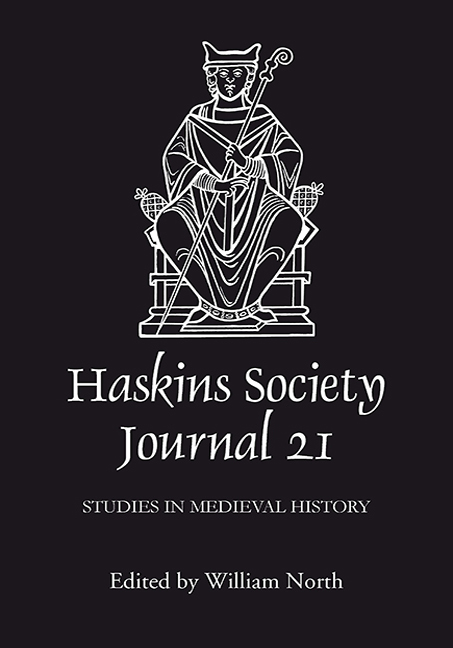Book contents
- Frontmatter
- Contents
- Editor's Note
- Abbreviations
- 1 Bede and the Rewriting of Sanctity
- 2 The Role of Rivers and Coastlines in Shaping Early English History
- 3 Containing Virginity: Sex and Society in Early Medieval England
- 4 Pagans and Infidels, Saracens and Sicilians: Identifying Muslims in the Eleventh-Century Chronicles of Norman Italy
- 5 Robert Curthose and the Norman Episcopate
- 6 The Revival of Roman Law: the Exceptiones Petri
- 7 Mutatis Mutandis: Literary Borrowing from Jerome's Letter to Eustochium and Others in the Life of Blessed Bernard of Tiron by Geoffrey Grossus
- 8 Acting Out Friendship: Signs and Gestures of Aristocratic Male Friendship in the Twelfth Century
- 9 The Quantification of Assarted Land in Mid- and Late Twelfth-Century England
- 10 Origins of Courtliness after 25 Years
6 - The Revival of Roman Law: the Exceptiones Petri
Published online by Cambridge University Press: 28 April 2017
- Frontmatter
- Contents
- Editor's Note
- Abbreviations
- 1 Bede and the Rewriting of Sanctity
- 2 The Role of Rivers and Coastlines in Shaping Early English History
- 3 Containing Virginity: Sex and Society in Early Medieval England
- 4 Pagans and Infidels, Saracens and Sicilians: Identifying Muslims in the Eleventh-Century Chronicles of Norman Italy
- 5 Robert Curthose and the Norman Episcopate
- 6 The Revival of Roman Law: the Exceptiones Petri
- 7 Mutatis Mutandis: Literary Borrowing from Jerome's Letter to Eustochium and Others in the Life of Blessed Bernard of Tiron by Geoffrey Grossus
- 8 Acting Out Friendship: Signs and Gestures of Aristocratic Male Friendship in the Twelfth Century
- 9 The Quantification of Assarted Land in Mid- and Late Twelfth-Century England
- 10 Origins of Courtliness after 25 Years
Summary
The twelfth century brought with it so many changes that one would still be justified in calling it unexplored, myriad relevant publications notwithstanding. One of the most important and complex of these changes was the development of legal studies. It was Charles Homer Haskins who early on drew particular attention to the revival of legal science in western Europe based on the Digest and the significance of the work of Irnerius, Bulgarus, Martinus, Hugo and Jacobus at the incipient university of Bologna during the first half of the century. The reappearance of the Justinian corpus – only a single complete manuscript had survived – marked ‘indeed “the beginning of everything,” a new epoch’. This was no exaggeration, even though the earlier Middle Ages, as is well known, were by no means a lawless society. On the contrary, that period created many new forms of law, from canon law, Lombard and other royal law and the formularies of notaries to feudal and customary norms. These centuries also preserved ancient Roman law in the form of the Codex Theodosianus of 438 and the Novels in the form of the Epitome Iuliani. However, it took the rediscovery of both the Digest and the new analytical method of distinctions developed in the last decades of the eleventh century to found the medieval science of law: that is, a centralized international jurisprudence based on the work of the Glossators active at Bologna and soon elsewhere.
The work of the Glossators, the patient and exact exploration of the text and meaning of the Digest and other parts of the Justinian corpus – the Institutes, the Codex and the Novels in their various forms – has long been the dominant focus of scholars interested in the characteristics and use of Roman law in the Middle Ages. It may appear, therefore, as if it all began in the ivory tower and remained a dry, scholastic enterprise at Bologna. That this was not the case, however, we learn from an unusual manual written in the south of France in the first half of the twelfth century: the Exceptiones legum romanorum or, as it is also called, the Exceptiones Petri (EP). A recently discovered manuscript of the EP is precisely the sort of evidence that could be of help in solving the problems surrounding this rare work and its origin.
- Type
- Chapter
- Information
- The Haskins Society Journal 212009. Studies in Medieval History, pp. 113 - 124Publisher: Boydell & BrewerPrint publication year: 2010

